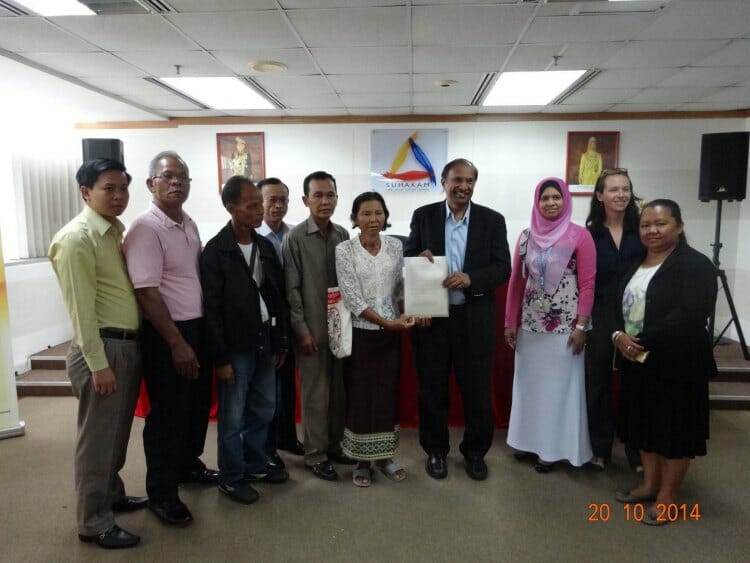“Our Voices Will Be Heard” – A Complaint to the Malaysian Human Rights Commission against the Developer of Don Sahong Dam
My name is Sem Vorn. I come from Koh Dambang village in Kratie province in Cambodia. I am indigenous Kuy and I am here today to express my deep concerns about the impacts of the Don Sahong dam on our fish and livelihoods.”
With this statement, Mrs. Sem Vorn, one of the Cambodian community members who travelled to Kuala Lumpur this week together with her Thai counterparts, appealed to the Malaysian Human Rights Commission (SUHAKAM) to accept the complaint against Mega First Corporation Berhad, a Malaysian developer of the Don Sahong dam, being built in Laos, less than two kilometres form the Cambodian border.

If built, this dam, which will be 32 m high with an installed capacity of no more than 260 MW, will entirely block the Hou Sahong channel, which is the main channel that allows for year-round downstream and upstream fish migrations. This is very likely to cause irreversible harm to downstream and upstream fisheries, seriously affecting the lives, livelihoods and health of millions of people in Laos, Cambodia, Thailand and Vietnam. The planned dam will also be located in a biodiversity hot spot, known for its iconic, but critically endangered, Irrawaddy dolphin population.
Yet the affected communities in Cambodia and Thailand received little or no information about the project and its impacts and were not provided with a meaningful opportunity by Mega First to have their voices heard and to express their concerns about the project.
Mega First claims that the project will not have any significant environmental or social impacts, moreover, it is trying to convince the public that the project will be beneficial for local communities, providing them with jobs and better housing. It also dismissively claims that any potential negative impacts will be easily mitigated, although it does not provide any detailed information on the efficacy of the proposed mitigation measures. Mega First wants the communities to believe that there is nothing to be concerned about solely on the basis of a “trial and error” mitigation theory.
But the affected communities do not agree.
The well-being of local people depends on fisheries, rice farming and Irrawaddy dolphin-driven eco-tourism and community members talk of their personal happiness in terms of availability of natural resources. Concerns about food security are widespread and must be taken extremely seriously.
SUHAKAM is one of the few forums available to communities where they can bring their complaints and have their concerns addressed because the political space in Laos is extremely small due to lack of domestic democratic institutions and the Mekong River Commission – an intergovernmental organization established in 1995 by Cambodia, Laos, Thailand and Vietnam to coordinate the use of the Mekong River for the countries’ mutual benefit and people’s well-being –is weak. However, this is the first transboundary case for SUHAKAM and it remains to be seen whether the commissioners will decide to take it under consideration. Community members are optimistic, but cautiously so, knowing full well that opposing large-scale development projects due to their environmental and social impacts can be a lengthy process.

Corporations operating abroad, in this case Mega First, have to face their responsibilities under international human rights law and governments in which they are incorporated have to ensure that they follow through. Today, SUHAKAM has a unique opportunity to act as a driver of change to ensure that both the Malaysian government and Mega First abide by their human rights obligations.
In the meantime, community members who attended the filing and submitted their statements to SUHAKAM are back home sharing their experience with their families and friends, all of them hopeful that finally their voices will be heard and their rights respected.
This post was written by Tanja Venisnik, former staff.






